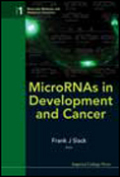
MicroRNAs have recently emerged as key regulators of gene expression during development and are frequently misexpressed in human disease states, in particular cancer. These 22-nucleotide-long transcripts act to promote or repress cell proliferation, migration and apoptosis during development, all of which are processes that go awry in cancer. Thus, microRNAs have the ability to behave like oncogenes or tumor suppressors. In addition, their small size and molecular properties make them amenable as targets and therapeutics in cancer treatment. This book goes into detail on how microRNAs represent a paradigm shift in thinking about gene regulation during development and disease, and provide the oncologist with a potentially powerful new battery of agents to diagnose and treat cancer. INDICE: Introduction to Gene Regulation by Small RNAs (A L Abbott); The Emerging Non-Coding RNA World (A M Khalil et al.); MicroRNAs in C. elegans Development (H Gro?hans & A E Müllner); MicroRNAs in Mammalian Development (A Ventura); MicroRNAs in Hematopoietic Development (S Monticelli); MicroRNAs Functionas Tumor Suppressor Genes and Oncogenes (A Esquela-Kerscher); Simultaneous Detection of Primary, Precursor and Mature MicroRNAs by qPCR (J-M Jiang et al.);Single Nucleotide Polymorphisms in MicroRNAs and MicroRNA Binding Sites with Roles in Cancer (L J Chin & F J Slack); MicroRNAs as Potential Diagnostics andTherapeutics (T Paranjape et al.); MicroRNA Target Prediction (I Rigoutsos & A Tsirigos); Non-Coding RNAs in Cancer — The Other Part of the Story (M Fabbri& G A Calin).
- ISBN: 978-1-84816-366-9
- Editorial: Imperial College
- Encuadernacion: Cartoné
- Páginas: 300
- Fecha Publicación: 01/12/2010
- Nº Volúmenes: 1
- Idioma: Inglés
